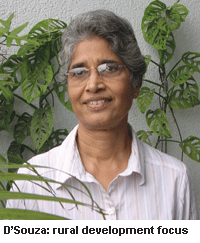For the past six months, 21 youth including seven women have been trooping into a classroom at a training centre sited in Kedgaon, a few km before Ahmednagar on the Pune-Ahmednagar highway, to transform into a new genre of rural journalists. Remarkably, none among this batch of youth drawn from the remotest villages of Maharashtra, had the faintest idea of the fundamentals of media and journalism before signing up for this free-of-charge learning programme. But within two weeks of attending class, they have started writing reports related to their villages in their news monthly, christened Rural Chronicle.
 “This publication is a live monthly which enables our students to learn the nitty-gritty of how news is collected, written, edited and published,” says Dr. Marcella D’Souza, executive director of Watershed Organisation Trust (WOTR, estb. 1993), who introduced this professional training programme in 2006 to provide jobless rural youth with development-oriented employment. “The objective of this programme is to enable our trainees to become watchdogs of their communities and ensure that social development programmes such as watershed management, women’s empowerment, child education and innovative farming are properly executed. It also makes them aware of various government schemes and gives them the confidence to interact with bureaucrats and gram panchayat members,” says D’Souza.
“This publication is a live monthly which enables our students to learn the nitty-gritty of how news is collected, written, edited and published,” says Dr. Marcella D’Souza, executive director of Watershed Organisation Trust (WOTR, estb. 1993), who introduced this professional training programme in 2006 to provide jobless rural youth with development-oriented employment. “The objective of this programme is to enable our trainees to become watchdogs of their communities and ensure that social development programmes such as watershed management, women’s empowerment, child education and innovative farming are properly executed. It also makes them aware of various government schemes and gives them the confidence to interact with bureaucrats and gram panchayat members,” says D’Souza.
Thus far 220 youth of both sexes have completed WOTR’s crash course in rural reporting since it was launched in 2006. Some of them have progressed to contributing to urban dailies and magazines as correspondents and stringers.
A qualified physician by profession, D’Souza chose to give up a flourishing private practice in Pune in 1987 to serve her commitment to the poor around the world. With six years’ experience in the mountains of Peru, South America, where she organised a large scale, community-led, indigenous, knowledge-based healthcare programme, she returned to India in 1992 to take charge as programme coordinator of an Indo-German watershed development programme in Maharashtra. The following year she joined her husband Crispino Lobo’s organisation — WOTR — to develop pedagogies for empowering women through formation of self-help groups at the village level, and mainstreaming them into the decision-making structures of their villages.
Indeed it was the conceptualisation and implementation of this unique project, titled ‘Wasundhara’, which won WOTR the Grand Kyoto Award, conferred on the trust in Istanbul in March this year. “Wasundhara in Sanskrit translates as ‘earth’ and it’s a word associated with compassion, caring, cooperation and harmony. To plan the development of their villages, local communities are assisted to assess needs, set priorities and identify government schemes and projects to fund them and prepare project plans,” explains D’Souza.
Training rural youth for journalism is part and parcel of Project Wasundhara. “They will be able to strengthen our focus on issues related to village development, particularly those such as climate change, regenerative ecosystems and adopting new agricultural and renewable energy technologies. To bring about real transformational change in village India, we need to educate and inform rural communities. That’s the rationale behind WOTR’s rural journalism programme. Everything is connected,” says D’Souza.
Huned Contractor (Pune)